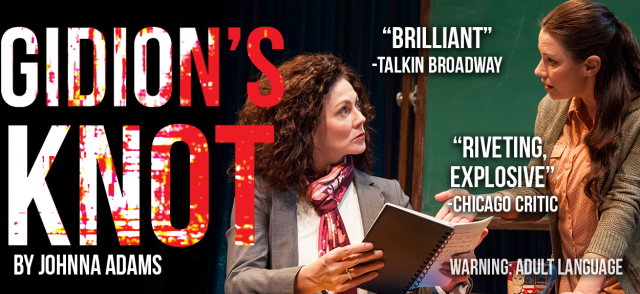
It’s no surprise that the title ”Gidion’s Knot” may be confused with the phrase “Gordian knot” and the concept it expresses. Gidion is a kid who has committed suicide, possibly due to bullying. A Gordian knot refers historically to a knot in a rope, symbolically representing civilization, that Alexander the Great had to untie with a single sword stroke or the world would suffer from evil political power and nihilism. It now refers to a problem solvable only by hard action or, at times, to a tie between mother and child that is all but impossible to destroy. Both meanings of the second phrase apply to the situation in Johnna Adams’s play. Kate Hampton’s strong, intractable Corryn Fell, Gidion’s mother, comes to his 5th grade classroom for a Parent-Teacher Conference arranged before his death. Awaiting the principal supposed to join in, Corryn engages teacher Heather Clark in a debate that reveals their conflicting values. Corryn learns childless Heather is teaching a second year after leaving a twice-degreed position in marketing and getting a master’s in education. The mother decides she’s inept. “My son hated you,” Corryn charges. From the start, Heather’s been disturbed by a private matter, adding to her unease with Corryn insinuating that dismissal of her son from school, probably added to by bullying, led to his suicide. Heather is goaded into reading the essay by Gidion that got him sent home. Well written but violently graphic, it’s a gory fantasy about killing and raping teachers, principal, and selected students. “This is how god remembers you,” he concluded. The reading launches Corryn, a professor of literature, into a positive assessment of Gidion’s “art” and a lecture on the greatness of the Marquis de Sade, medieval poetry being mostly about “fighting and fucking,” and how Gidion was only like 18th and 19th century poets who identified themselves as incarnations of earlier ones. (I think she quoted Donne but may also have been referring to the Scots who pretended to be ancient poets like Osian.) Helen, fearing what Gidion might do, wanted to protect her students. She also knew about a girl who liked Gidion and a boy named Jake, who might have been the bully who bothered him. And there was a younger boy somehow involved. Corryn continues to be absorbed by the relationship between mythological gods pictured in the classroom and identified in the attendant myths studied. She declares her favor of Shiva (a Hindu go who’s a patron of the arts but split between creator and destroyer, terror and delight, feared and beneficent.) Helen reveals enough about Gidion and his friends to close the debate. Despite their differences, the women come together over a problem Helen has in which death figures. The real beauty of Johnna Adams’ play at Florida Studio Theater comes from the performances of Kate Hampton and Katherine Michelle Tanner, who seem to have been made for their roles. Director Jason Cannon has guided them through wonderfully realistic portrayals in a play that is theatrically real but (I speak from experience) not a realistic picture of a 5th grade class, with student desks aligned on a somewhat strange slant. The lessons on myths are too advanced for a grade that should be dealing with literature less on a higher level and more on expository writing, if of essays. It is a grade that should less involve concentration on one group of gods (which might be construed as lesson on religion) and more on history, biographies, classic — at this level, mostly American — works of literature. Author Johnna Adams needs to do more research on education as it’s practiced in public schools. In today’s world, where students may no longer be taught cursive, Helen has used it to outline lesson topics on the slate by her desk. Also, in classrooms at all times, teachers should not post illustrative pictures so high above display boards that much shorter students cannot figure out fine points in them and grasp why they exist. Further, it is against practice for a teacher to talk to a parent about children not her own, as Helen does. Finally, how did a mother get past the school guard and into a classroom after school hours? Despite the artificiality of Adams’s play, it treats real contemporary problems like parenting and education as well as philosophical and aesthetic differences that impact humanities, sciences and arts. If you don’t mind thinking about such matters, you will enjoy how the production at FST gets you involved in a play that deals with them.
Both women at last seem to admit a problem dealing with the young ones in their charge. Is that the conclusion?
